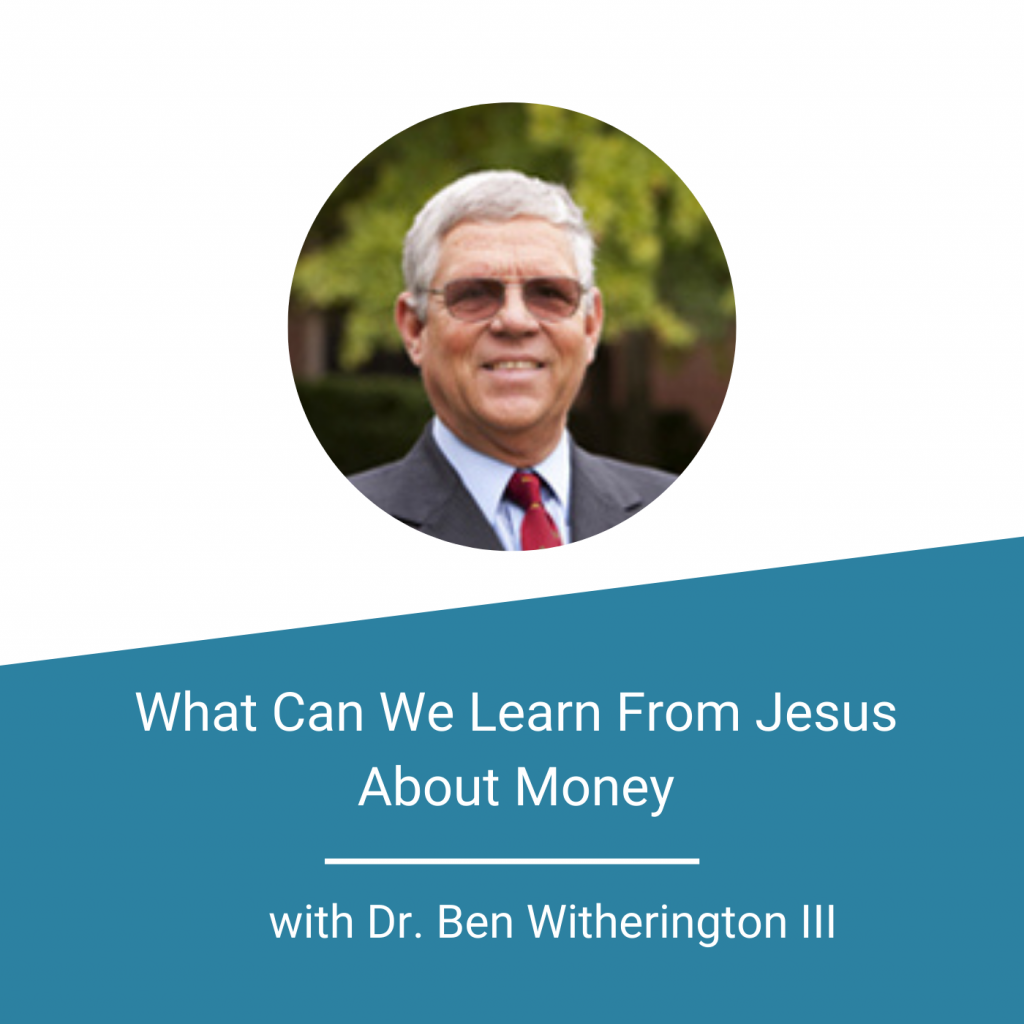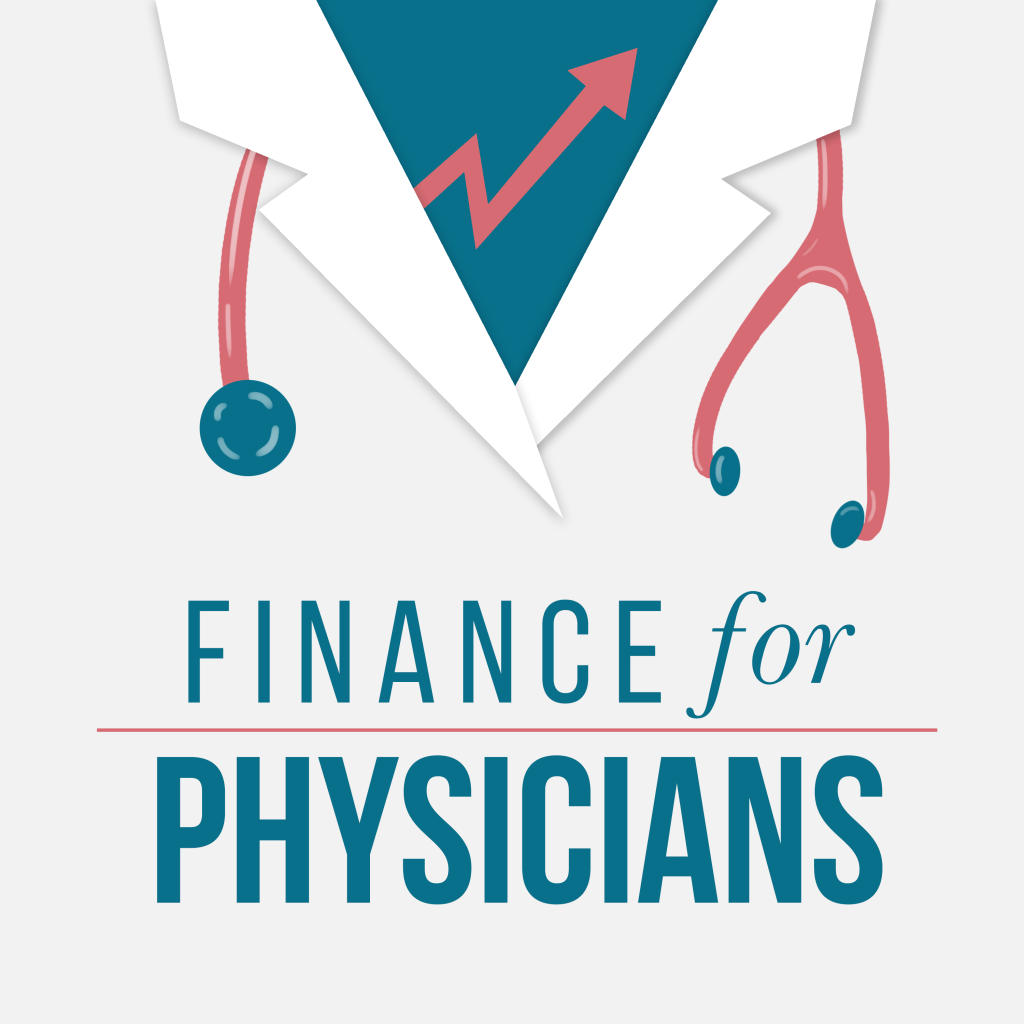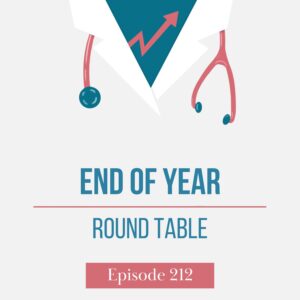During the holiday season, most people think about generosity, taking care of others, and their faith. Money is mentioned quite a bit in the Bible. What can people learn from Jesus about money?
In this episode of the Finance For Physicians Podcast, Daniel Wrenne talks to Dr. Ben Witherington III about valuable financial lessons taught by Jesus in the Bible that are still applicable to daily life. Ben is a world-renowned Biblical scholar, author, and speaker. Currently, he is a professor at Asbury Theological Seminary.
Topics Discussed:
- Why was money mentioned in the Bible? World moved from barter to money
- Dead Presidents vs. Living Rulers: Money was propaganda; sign of oppression
- Critiques about reasonable, just, and fair uses of money/resources with context
- Big Picture: God is creator of all things and owner of everything, including money
- Implications: What would God have you do with money/resources he blesses you
- Serve Money or God? Who, what, where, how to trust use of money, resources
- Tax Deductions/Donations: Do’s, don’ts of sacrificial giving vs. financial suicide
- John Wesley’s The Use of Money Principles:
- Make all the money you can by honest means
- Save all you can
- Give all you can
- Necessities vs. Luxuries: How much is too much? What’s needed to live simply?
- Practice What You Preach: Church has obligation to take care of its own, others
- Unplug and De-enculturate: Maintain values to live fruitful, helpful, meaningful life
- Parable of Talents: Issue of what you do with what you have—be a good steward
- What does Jesus want us to do with money? Jesus wants us to invest in others
- Why be a methodist? Believe in social holiness and motivated by faith
Links:
Jesus and Money by Dr. Ben Witherington III
The Use of Money by John Wesley
Rich Christians in an Age of Hunger by Ronald Sider
Heart, Soul, and Money: A Christian View of Possessions by Craig Blomberg
United Methodist Committee on Relief (UMCOR)
Federal Emergency Management Agency (FEMA)
Full Episode Transcript
Daniel Wrenne: What’s up, everyone. Welcome to the Finance for Physicians Podcast. I’m your host, Daniel Wrenne. Join me as we dig into what it looks like for physicians to begin using their finances as a tool to live better lives. You can learn more about our resources at financeforphysicians.co. Let’s jump into today’s episode.
I’m so thankful to be here with you today. This episode will be going live on Christmas Eve. And so this is the time of year when many of you will be thinking about things like generosity, taking care of others, and maybe even your faith. And if you’re a Christian like myself, you see Christmas as the celebration of Jesus’s birth. So on the Eve of Jesus’s birthday celebration, I wanted to take the opportunity and talk with you more about the lessons Jesus taught us about how to manage our finances. I believe that Jesus and the Bible as a whole teach many valuable money lessons that form the baseline of the Christian calling. And even for non-Christians, the financial lessons taught there are very valuable and applicable to daily life.
Now, I’m just a money guy. I’m a Christian, but I’m certainly far from being a biblical expert. So today I brought in a friend to help me tackle this topic, who happens to also be one of the world’s most respected biblical scholars. My guest today has been a contributor to many of the major media outlets, such as the Discovery Channel, History Channel, NBC, ABC, CBS, CNN, pretty much all the big networks. He’s also a sought after speaker, the author of well over 60 books, and is currently a professor at Asbury Theological Seminary. He’s definitely a very educated guy and a successful guy, but I think on top of that, what’s really special about him is that he has a gift of being able to boil down these complex and delicate topics into more digestible content and relatable stories. My guest today is Dr. Ben Witherington III. Welcome, Ben.
Dr. Ben Witherington III: Good to be with you.
DW: So money is mentioned quite a bit in the Bible. I don’t know exactly how many times, but particularly in Jesus’s teachings, Why do you think money comes up so often in the Bible?
BW: Well, one of the reasons that it comes up quite a bit, especially in the New Testament, is that that whole world—the Greco-Roman world—was moving from a sort of barter economy to a more money-based economy. And that’s one of the reasons it comes up. Money in antiquity was things minted by rulers, Kings, monarchs, emperors, governors, those sorts of things. And instead of having pictures of dead presidents, they had pictures of living rulers. So money was propaganda, among other things, for the ruler. Not in God we trust, it’s in Cesar we trust. So that’s kind of the context. And here’s the problem for Jews like Jesus or Paul. Well, it’s foreign rulers who are pagans, whose policy is to believe in multiple Gods, who are making the money, literally minting the coins, right? And so that’s an issue, and one of the reasons money often has a sort of negative valence in the new Testament. For example, Paul says, “The love of money is a root of all kinds of evil” because it was a sign of oppression. It was a sign of a foreign ruler running their life, forcing them to pay outrageous taxes, etc. And of course they were not pleased with that. They didn’t think that was a reasonable use of their resources. And so that’s one of the reasons quite a lot of the things are said. Jesus himself says you can’t serve both God and “mammon” or money. And so there are some very specific critiques about reasonable, just, or fair uses of resources. They have critiques of things in that kind of context. I like to say a text without context is just a pretext for what you want it to mean. And for me, one of the problems in the way Christians have often approached this issue of money is by soundbites. They take a favorite verse from Proverbs or somewhere, and then run out of the building with it without really studying what it meant; its original context. So I like to sort of start a discussion like this by talking about the context for all of the writers of the Bible. The basic premise is the earth is the Lord’s and the fullness thereof. God is the creator of all things, and he’s the owner of everything. And that means that people of faith view everything, including money and whatever other property they may have, as belonging to God. But they are stewards of it, and they want to be good stewards of the resources God has blessed them with. So that’s kind of the big picture context. So when you think about the implications of that, one of the implications is you have to keep asking the question, “What would God have me do with this?” Because it’s neither a theory of strictly private property, nor is it a theory of “the government owns everything,” you know, communism. It’s not a theory of either of those two things. It’s an approach that says the Lord owns everything. I’m a steward of God’s resources that He’s given me. How best may I be a good steward of the resources I’ve been blessed with? That’s the kind of questions to be asked.
DW: So you mentioned you can’t serve both money and God. What does it look like to serve money?
BW: Well, whatever is your ultimate source of security in your life is your God. And so the question is, what do you put your trust and your faith in? And ultimately that’s the big question. Now, a lot of people give lip service to, you know, “In God we trust. All others pay cash.” I’ve seen that sign in any numbers stores, right? But, the actual default, the way they actually live is on the basis of how they view their own resources; the material resources they have. And they hold on to them, you know, as carefully as they can. My grandparents lived through the depression, as did my mother and my father. And one of the things that was regularly said about my grandmother is that she could squeeze a nickel till the blood vessels in Abraham Lincoln’s face burst. So they learned how to pinch pennies. And for them, their sense of any kind of security came from holding on tightly to whatever material resources they had. They went through 1929, the great stock market crash, right? And, and as a result of that, my grandmother never again trusted banks. She had everything in the hope chest… All of the resources she made from selling pianos at a piano store in Wilmington, North Carolina, she put in the hope chest. So not surprisingly, when granny died everybody wanted the hope chest because who knows what untold resources were in the treasure chest. So the big picture is this: What do you really trust and who in whom you really put your trust? And can you trust God enough—and his principles about how to use your resources—to not feel that you have to be the master of your own fate, and in control of every aspect of your life? At the very core of your being, do you really trust God and his principles to live your life? I personally would say that’s a very freeing thing to do. I mean, I grew up in High Point North Carolina, there were 40 furniture barons who were millionaires in North Carolina. And I went to their church. Most of them were in my church. And I have to tell you, most of them were some of the most miserable people I have ever met. They mainly spent their lives protecting their resources, building walls around the giant houses, and all that sort of stuff. And they didn’t seem very happy. They didn’t really seem like they were living a full and free life. They were so self-protective. I remember a campaign where we were trying to raise money to publish a modern annotated edition of John Wesley’s works, which had not been done since the middle of the 19th century. And I remember going to one of these wealthy widows who was the heir to one of the furniture fortunes and asking if she would make a donation to make it possible for us to publish these works. I got a formal letter from her accountant that said, “I’m afraid that Mrs. Ragsdale has now given all that she can possibly give this year that is a tax deduction. Therefore, we are not giving anymore.”
DW: Right. The last episode we did was talking about the tax strategies around giving. And so what I really tried to emphasize in that conversation was that a lot of people say that, you know, “I need to save on tax. Therefore I give,” which is kind of backwards, right? So give first and then make the most of the taxes. And so that’s a great example of what not to do, I think, if you’re trying to give sacrificially, right?
BW: And the new Testament principle is sacrificial giving. I mean, there are plenty of Christian pastors who think we’re still in the Old Testament, and that therefore tithing is what you need to do. And you need to give 10% out of your gross, not out of your net. You’ve probably heard sermons like that. Actually that’s not the New Testament principle. The New Testament principle is self-sacrificial giving, and you can’t put a figure on that. What is a sacrifice for one person may well be a financial suicide, or not enough for another person, right? So it differs for every person, depending on what resources they actually have. I’ll give you a good example. I mean, Jesus sets up the example of the widow with the widow’s mite. Remember the story? You’ve got all these wealthy people coming throwing major silver into the temple treasury, giving a lot, then this poor little widow, who’s got two pennies. And she puts all of her assets, the two coins, probably the last remainder of her dowry, into the temple treasury. And then Jesus asks the question, “Well, who gave more?” And the answer is that she gave self sacrificially. She gave even in spite of the fact that she was impecunious, and didn’t have a lot of resources. They gave out of their excess. So Jesus is trying to teach His disciples the principle of sacrificial giving, like Jesus Himself gave to others. He gave His whole life as a sacrifice for us. So sacrificial giving is really what Christians are called to, and that looks differently for every Christian.
DW: When I hear “sacrificial giving,” I think that’s a gift that really you feel, or it moves the needle in your life. Not just like a tax shelter, or like a little bit off the top. You have 10 billion, you might as well give 500 million of it. And you’re not going to feel that. But, “Sacrificial,” the word to me at least implies that it’s something you feel.
BW: Right. John Wesley has a very famous sermon called “On the use of Money,” which I would urge you and all of your audience to read. And it has three principles. Now you have to remember, John Wesley was reared by Puritan parents who became Anglicans, but in any case, here were the three principles: Make all the money you can by honest means, underline the word “honest.” So for example, he would say, don’t be making money off of pornography. I mean, it’s an obvious one, right? I’m just going to give you an obvious example, make all the money you can by honest means; by hard work. And honest means not by cheating, not by deceiving, not by lying, et cetera. Secondly, save all you can. And then thirdly, he says, give all you can. He says if you do one and two, but don’t do three, you may be a living person, but you’re a dead Christian. And part of this, the backstory behind that for John Wesley is that he counseled his fellow Christians to live simply, not luxuriously, you know, not to invest in Gucci, to dress simply, to eat simply, to buy things for the home simply, not to live luxuriously. And so he would draw up lists, he’d say, make a list of things that are necessities, like food, shelter, and clothing; and things that are luxuries. Start thinking through your life and ask yourself the question of which is in which column. And if you have a lot more in column B of luxuries than you have necessities, well, something’s wrong with this picture. And he’s living on the cusp of the 18th century. The cusp of the modern industrial complex, and the beginning of modern finances and investments and interest, and all of that sort of stuff. Of course way before credit cards, but at the beginning of modern Western finance, right? And this is the advice he’s giving to his ministers, to his lay people. And the end result is that an enormous amount of money was given to what we would call charitable causes. John Wesley himself said, I am living my life—See, now he had no children—I’m living my life so that by the end of my life, I want to have divested myself of all of my property. And what was left over, which was resources from his books, was given to the Methodist conference. Now that’s an example of a single person who doesn’t have children, et cetera. Right. But, nonetheless, the point is: Find ways to give self sacrificially throughout your life. That’s kind of the principle, the basic principle. And I think that’s the way Jesus viewed life as well. You know, I think that’s what Jesus calls people to. Yeah.
DW: I think if I’m looking at those three principles, I’m thinking a lot of people maybe look at those three and they’re saying, okay, yeah, I got the first one, I got that, I’m making honest means or honest living. And then they say, save all you can. Well, you know what, maybe I’m doing okay there. I’m not sure maybe I am. Maybe I’m not. And then they’re like, and I’m giving all I can too, because you know, there’s just not a lot left over. But what they’re missing is the point you added about his teaching about the necessities and less luxury. We’re in a luxury consumerism society. So that’s kind of hard.
BW: Well, it is. And it’s different for every culture. I’ll give you an example. When we moved to England in 1977, we lived in downtown Durham, England in an old mansion which belong to the Methodist church, which had become the caretaker’s cottage because my wife was the caretaker of the church and we had no car. This is “BC: before cellphone” too. Before cellphones, my poor wife had to type my doctoral thesis twice on an IBM electric typewriter. Okay.
DW: What’s a typewriter? Just kidding, sorry.
BW: You say that, but my daughter in the eighties saw this typewriter in our house in Ashland, Ohio and said, “Daddy, it’s a printer with a keyboard.” That’s right. Funny. That’s exactly what it is. A printer with a keyboard, Otherwise known as a typewriter. That’s exactly right. I mean, we had no car. We had no telephone. We had no refrigerator, had no television, and we lived just fine. We had to shop a lot more frequently. We had our cold storage in a pantry, because it was cool enough to keep things, you know, without it spoiling for a day or two. And we were fine. We had de-enculturated ourselves from many things that we thought were necessities while growing up in America. As it turned out, they weren’t absolute necessities. But to live in the environment you and I live in, I mean, for example, we couldn’t do this podcast unless we have electricity and computers and that sort of stuff. So what is a luxury for one person may be a necessity for jobs and other things for other people. So the assessment is difficult. How much is too much? How much am I actually spending on cable TV, for example, you know, when I could have lived more simply and just had Hulu or something, those kinds of things.
DW: Yeah. I think there are the gray areas. When, you know, you talk about generalities, but I think if you self examine, if you’re looking at yourself, you probably know, if you have a brand new $70,000 SUV and private school for children, and in the nicest neighborhood in town. And you know, you’re kind of at the higher end of the luxuries in your locality. We’re not saying that’s bad. It’s just, that’s the examination, right there. Maybe you should think about, “Is that in line with my priorities as a Christian?”
BW: Exactly. And you know, I mean, the goal is get to a place where your heart is run, not by guilt, but by generosity, right? I didn’t write the little book “Jesus and Money” to guilt everybody into doing the right thing. I’ve just seen so many examples of generosity and how it blessed and enriched their lives—never mind the people they gave to—and made them better persons, better human beings through that. I’ll give you one example. We used to have in our Methodist church every member canvas in October and November, where we would have teams, one of which my father ran, teams of church stewards. They would go visit every member of the church in their homes. Now this is a church of 8,000 members. Okay. So no small task, right? And so one of the guys that was on my daddy’s team was an up and coming young lawyer in Charlotte. This was in Charlotte, North Carolina. I mean, he was Brooks Brothers suit, Beamers, the whole nine yards. Right. And one of the people he was assigned to go and visit was a little old lady who lived in a trailer park on the edge of Charlotte on a fixed income. She’s a widow, right? So he gets out there, he drives into the gravel driveway. There’s steps up to the trailer. And he’s already feeling sheepish about asking her for her pledge for the coming church year. Right. He gets in there, she’s fixed toll house cookies and sweet tea. I have a great conversation. And he says it’s time for him to go. He says, “Well, ma’am, I know you’re on a very fixed income. So I will put a little more into my pledge to cover you. And she gets up in his face, walks up to him, grabs him by his lapels and says, “Don’t you take away from me the privilege of contributing to the ministry of Jesus. Don’t you do it. My pledge is on the refrigerator. I’ll be right back.” And now he really felt like a skunk, right? He brings in the pledge card and says, “This is what I can give, it’s more than I can afford, but I know then I’m like that widow and I’m giving sacrificially.” Now for her, a sacrifice was way, way, way less than a tax write-off for the guy who’s receiving the money because it’s different for everybody. The question, have you gone through the moral discipline of evaluating your resources and asked and answered the question? What is a sacrifice for me? And one of the interesting things to do is to study the passage at the end of Acts two and the end of Acts four, which tells us about the original Christian community and how they worked with each other, right? The things that were said about their life together is that they were considering none of what they had as merely private property. They were considering all of it available to the community as needed, right? So it was from those who had resources to those who had needs. So that the bottom line was, there was no needy person amongst them. Food, shelter, and clothing, basic need, need for work. That sort of thing. The community was going to take care of that. Now, each of those individuals who had resources continued to have resources, they weren’t expected to give it all to some community pot, and then somebody would parcel it out little bit to everybody like a communistic system. No, it was from those who have the resources to those who had the needs—that there was no more need in the community—was the most basic principle.
DW: Yeah. That was the early days too. That was the 12 disciples…
BW: Right. The original meetings of the disciples. And then if you fast forward to like a little later in the story, if you go forward to Acts five and six, you have the story of Ananias and Sapphira, who had claimed that the had sold all of their property and given it all to St. Peter, right, to the community, was a lie. And they are called on the carpet by Peter, right? There’s a cataclysmic result. They have heart attacks and die, you know, but what Peter says is the right thing, he says, “Was it not still your possession when you had sold everything?” In other words, “Was it still not up to your moral discernment, what to do with the resources that you got from what you sold?” He didn’t expect them to give everything to him. What he wanted was honesty. Honesty about what they had given, because honesty is the bottom line really. And so lying to the Holy spirit was their sin, not not giving every last scrap of property they had. So it seems very clear that the earliest Christian community was remarkably generous, but they weren’t expecting everybody to divest everything they had and give it to a common pot of the church.
DW: Yeah, well, so we live in a capitalistic culture society, and it seems like the wealth gap has gotten bigger and bigger. And a lot of people maybe hear this and they’re like, why don’t, you know, we don’t need to do socialism. This is socialism. But really what you’re saying is the people with means all were kind of on the same page with their philosophy around sacrificial giving, which then provided for all those —
BW: 00:24:47 And again, this was not a governmental thing.
DW: Yeah. That’s the difference.
BW: Big difference between a governmental social security system and the church taking care of their own, big difference between those two things and what the Bible is talking about B, not A. But here’s the problem. If you look at the history of the church, go all the way back to the Emperor Constantine, when Christianity became a legal religion in the Roman empire and all the history, the church felt it incumbent on them to provide the institutions of taking care of people. So the church founded all the hospitals, right? The church did the salvation army thing in all directions to help the poor and the indigent and the diseased and all of that. I mean, all of these…for example, Goodwill industries is a spinoff from the United Methodist church. Most people don’t know that who are listening to this, right. Hull House, which took care of widows and battered women and domestic violence persons is a spinoff from the United Methodist church.
BW: We have always believed that there is a social holiness, as well as spiritual holiness, and that if you don’t practice what you preach, and if you don’t live out the social—as well as the spiritual—values of the gospel, well you may be a living person, but you’re not much of a Christian. So, you know, I do think that the church has an obligation to take care of its own and others as well. I mean, we, you know, at Centenary, we have a love fund that we collect once a month to help people who come to the church on Monday, desperate for money, for food, or clothing, or housing, or that sort of stuff. I think that’s a good thing. And I really would like to see persons who are Christians get away from this whole notion of charity. And here’s why charity, the assumption behind charity is what’s mine is mine. If I give it to you—which is an option—If I give it to you, well, I’m charitable. Well, what I’m saying is that the biblical principle is it’s not optional. Being a self-sacrificial Christian is a requirement of being a genuine Christian. Therefore it’s not a matter of charity. It’s a matter of self-sacrifice.
DW: Now the Americans are going to say, “I don’t like to be required of anything.” You know, that’s kind of the cultural thing, but I think what a lot of people miss is—I think the science is coming around to this—but there’s a, like a really good, positive impact when you give that sometimes people miss. Giving makes you a better person. And it seems like the more you give the happier you are and the science, like I was saying, there’s a lot of good science coming out that shows kind of the research angle behind that, that that does actually happen. And if you’ve given you know, yourself, especially when you’re involved in the organization or cause that you’re giving to, it does really move the needle on your happiness factor.
BW: And I would call that a byproduct. That’s not the motive for doing, but it’s a happy byproduct. And I agree with that. Absolutely. And here’s the other thing. What happens when you have too many possessions is they start possessing you, not the other way around, you know. There’s a hilarious routine from back in my day with George Carlin called, “Stuff, what are you going to do with your stuff?” Well, now we have space centers where we store our extra stuff because we’ve got too much stuff and we don’t have enough room for our stuff. Well, if you actually get to that point in your life, and that’s true, then maybe you need to think about giving a lot of it away. And de-enculturating yourself from the incessant advertisement of our culture that you need more, you need more, you need more, you need more, you know, and so part of the process for a Christian is to just de-enculturae ourselves.
DW: How do you do that?
BW: Well, first of all, watch a lot less advertisement
DW: 00:29:05 Unplug.
BW: Spend more time reading good quality resources and not surfing the internet, which I mean, even if you go to YouTube, my goodness me, you’re going to have six advertisements in the middle of one little program.
DW: That definitely affects you.
BW: It messes with your head. You know, I mean, I’ve often made the point to ministers. You think that one hour a week or two hours a week of you sharing the good news with people is gonna outweigh something like 70 hours of advertisements a week that they’re going to see on television or hear on the radio, no, you are what you consume. And so you have to deliberately go on a process of de-enculturating yourself from all of that. If you want to maintain Christian values as your guidelines for how to live a fruitful, helpful and meaningful life. I mean, that’s what you’ve got to do
DW: 00:30:05 Otherwise you’re being influenced by your culture around you.
BW: 00:30:08 By osmosis, you just, you know, I mean, for me, there are two things that I have a hard time saying no to: books and music, which I grew up with both, and not surprisingly, I’m a teacher. And I, you know, I do a lot of music as well, very hard for me to say no to all of that sort of stuff. My Amazon wishlist has those kind of things. I’d like this Blu-ray disc please, you know, and I’d like this CD, please, if you don’t mind, you know. The real test case is: Figure out the things that you love the most, whether it’s sports or music or whatever it is, that’s, you know, in the category of non-essentials like hobbies, whatever, and then ask yourself how much of a sacrifice are you prepared to make from that pile of stuff that’s not food, shelter, and clothing. And then you’ll find out where your heart really is. Jesus says where your treasure is, there also will be your heart. Well, that’s right. That’s exactly right. And so it’s an ongoing process in a materialistic culture and, you know, God bless America. It’s the most materialistic society in human history. In a materialistic culture, it is a constant process of de-enculturating yourself, or else you are just swamped by a tsunami of felt needs that are not real needs. Oh, I have to have the latest iPhone. I have to have the latest, this, that, and the other, you know, really, do you need that? Well, some people do for their work, but most people don’t.
DW: Sometimes I will find myself thinking, as we go to the same church, and as we pull up—and I’m guilty in this—I’m in this group as well, but you see everybody pull up in their nice fancy cars and everybody’s so pretty and well-manicured, and then you walk in to church and everybody’s got all their nice, nice clothes on and everything like that. And, and then we do the thing and then we go home to our really nice houses in the nice areas of town. And sometimes I’m like, well, is this what we’re meant to be doing? I mean, is that our call? And sometimes, I mean, I think if you really asked yourself that question, probably not.
BW: Yeah. And, you know, I mean, one of the good things about our church sitting there at UMC is we have plenty of opportunities to get involved in missions that really change your worldview, like going to Africa and working with the village and helping them get water sources.
DW: Now that’s where it’s at.
BW: Well, it changes your sense of what is really important in life. I mean, one of the things Ann and I did is we realized that the lifestyle of conspicuous consumption is endless. You know, there’s always more to consume, and bigger and better. So we just sort of try to live by certain principles. We support a lot of charitable causes, all kinds of causes, you know, and individuals. We’ve adopted children in the Philippines and elsewhere that we supported their life and their education, that sort of stuff. We’re still supporting our Russian daughter, who’s been our sort of second daughter for the last 18, 20 years, you know, and now she’s got a job in Paris, and for the first time she’s gainfully employed, Woohoo! That’s all great. You know, but even how we lived our day-to-day life, we asked the question, how can we live more simply? Well, for one thing, we went to hybrids, we went to hybrid automobiles, you know, Ulia drove a Prius, Ann drove a Prius V, I drive a Camry hybrid. We try to practice clean or cleaner consumption because these vehicles are perfectly fine to get you where you need to go.Yeah. And they save a lot of money on gas and pollution and all that sort of stuff. And that’s just an example of how you can simplify your life and live a life that’s a better witness.
DW: One of the things I was going to ask you about… One of the Bible verses, it always throws me for a loop. Oh, here it is. Here we go. It’s in Matthew 25:14-30, the parable of the three servants. I was curious of your take on that. And it’s basically this, the story about the servants that get the money and they are charged with investing it, I guess, or being wise with it. And their master comes back and two out of three of them basically get a return on their money. And then the third one just dug a hole and stuck it in it and got no return on it. And then the master tells the guy that just stuck it in the hole, he’s like, yeah, that’s ridiculous. Get out of here. You’re done. Yeah.
BW: 00:35:13 Well, I would say the issue there is what you do with what you have. The issue is not that this person had one talent. This person had two talents. This person had five talents. And one of the things about parables is you have to figure out the point of comparison because God is not like a stingy, wealthy estate owner who is going to read the riot act to people who only managed to duplicate two talents into four talents or whatever, right. That’s not the nature of God. But the point about this is what you do with what you have. And again, the principle is being a good steward of what you have, not what you don’t have, what you do have, and the guy who buried it, buried it because he thought that his master was a harsh taskmaster and he was more afraid of losing it than he was of taking the risk of investing it and doing something positive with it, right? Yes. Not on the basis of faith, Not on the basis of “I’m going to take a risk.” I mean, if he’d come back and invested it and not gotten anything, the outcome of the parable would have been different, but by the way, his behavior was normal behavior in that day. I mean, you remember the story of the man who goes out and buys a field, cause he’s found a treasure in the field. People normally buried things in the backyard because there were not banks as we know them. Where people stored resources was in the temple. Now that’s a long way from Galilee, right? You’re going to load up your cart with your gold bullion and go all the way to the temple and put it in the, the, uh…
DW: Safety deposit box?
BW: Cubicle in the temple, because the idea is temples are where you put your resources because God is protecting them. Otherwise you buried in the backyard and put it under the mattress or whatever. So the guy who buried the one talent was acting perfectly normally for that culture, but that’s not what Jesus wants. Jesus wants us to invest in others and take risks and step out on faith and do things with the resources.
DW: Yeah. I think a lot of people are operating out of fear, at least the past year or so, especially.
BW: I think our whole culture has been bingeing on fear since 9/11. If you really think about the psychology of American culture, it really has been a time where fear-based thinking, even of Christians, is ruling most of their decisions. Not faith-based decisions, fear-based.
DW: Yeah. Which is not a great place to be. Even, you know, whether you’re a Christian or not. I know it’s very much taught in the Bible. And for anybody, you don’t want to live your life in fear. That’s definitely not a good place to be. A lot of people we work with will say, you know, giving is important and that they’re definitely interested in giving. And want to do it, or even have been setting aside money to give. But maybe they’re not in a church yet that they are comfortable with, or maybe they’re looking, or maybe they don’t like what somebody is doing, and they’re just kind of, you know, in some way procrastinating maybe, but (they think) for good reason, and kind of looking for that, either church or cause that’s really going to align more with their values. I’m curious what your thoughts are on that, because I have seen people…it seems like sometimes they feel guilty, but I’m not sure. I don’t know how the division is between giving to the church, as in this one building, you know, division of the church in this area versus, you know, other causes.
BW: Well, one of the reasons I’m a Methodist is because we do believe in social wholeness. I’ll give you one example, which is from what we call our portion, but it goes to the general church. Let’s take the principle of UMCOR. You didn’t mind it. United Methodist Committee on Relief. In UMCOR, every single dollar that you give to UMCOR goes to the work of UMCOR. Like there’s a hurricane in Louisiana, it destroys all this stuff. Well guess what? UMCOR is going to be there. Help people put their lives back together. They give them food, shelter and clothing, bring trailers so they’ll have somewhere to live, not waiting for FEMA. We’re there before FEMA. Right? Many Methodists don’t even know we do this. Right. But I’m very proud of our church, that the church covers the overhead so that every dollar that every single Methodist gives to UMCOR goes to the cause. Right. And that’s typical. That’s very typical of Methodism. I mean, John Wesley founded orphanages, he founded poor houses for widows and whatnot. We’ve always been about sharing the good news in a way that changes society for the better, and making sure that the least, the last, and the lost don’t fall off the table and aren’t taken care of. Right. And so for me, I have always been a part of the Methodist church and always wanted to be because as John Wesley says, “Without social holiness, there is no spiritual holiness,” Right? Without actually loving and caring about your neighbor, then you’re not fully living out the gospel. And, especially in a time like this, in a pandemic with people losing their jobs and all of this sort of thing, you know, I mean, I saw a pathetic one the other day. There’s a guy standing at the exit from Walmart over on Nicholasville Road with a sign that says, “I lost my job as a carpenter. And I have five young children and a wife, anything would help. God bless you.” You know? I mean, how does your heart not go out to a person like that? And some persons would say to me, well, how do you know he’s not just a worker? How do you know that he’s just not a con artist? I don’t know, but he’s standing there in the pouring, freezing rain with a cardboard sign. Right. That says that. So I am going to move on faith and get what I can out of my wallet and give him some money because the giving itself was for the right motives, whatever he might do with it, whatever might be true about his life. If I’m going to err on any side, I’m going to err on the side of generosity and possibly helping this person and trusting God that that’s what happened. Right. Rather than thinking, “Oh, well here’s just another con artist.” Right? I think cynicism is the enemy of faith. Of course we have to do critical thinking about these things. But at the end of the day, when you’re faced with a choice like that, err, on the side of generosity, err on the side of being a good witness, you know. Remember the parable where Jesus says the disciples say, “Well Lord, when did we see you naked?” Or “When did we see you hungry?” Or “When did we see you in prison?” And He says, “And as much you’ve not done it to the least of these, you’ve not done it to me.” Right. Jesus holds us accountable for how we relate. And I would say, it’s true of a society. You can judge a society by how it treats its least fortunate members. And that’s certainly true as a Christian, you can judge a Christian by how they react to the least fortunate persons in their church or in their community or in their neighborhood. And whether they’re willing to help them live a better life. You know, you can tell a lot about a person by how they react to those situations.
DW: Yeah, that’s a lot of good stuff. I definitely think that’s the right frame of thought. So as we wrap up, I’m curious, for people that want to kind of dig more into understanding what the Bible says about money, I know you’ve even written a book on this. But what sort of suggestions would you have? What’s the title of your book?
BW: Jesus and Money. And it’s actually one of my shorter books.
DW: Nice. How short is your short book? I’m curious
BW: 2 or 300 pages.
DW: Oh, how long was your longest book?
BW: So my Acts commentary is close to 900 pages, but this book has a lot of the things that I’ve talked about in this podcast. And it has, in an appendix, John Wesley’s sermon on the use of money, which is a real wake-up call, you know, do you want to be a living person but a dead Christian? No, no, you do not. So, you know, I think that that would help folks along the way. And it’s written at a level that is distilled for, you know, the educated lay person or doctors, lawyers, whoever. They don’t have to be biblically literate. They just have to care and be able to read, you know, and maybe that book would help.
DW: Any other suggestions?
BW: Well, yes. I’m going to recommend an old book that they can get for probably 5 cents on Amazon. Ron Sider’s Rich Christians in an age of Hunger. That is a powerful, powerful book. It’s very convicting. It certainly convicted me when I read it first in seminary many, many years ago, but “Rich Christians in an age of Hunger.” And he’s updated it. I mean, there’s been second and third editions because it had hit like a ton of bricks when it first came out and then it’s gone through various additions since.
DW: Yeah, that sounds kind of like, a radical type of a book to me, from the title, at least.
BW: Well, in some ways it is, but most ways it’s really not. He’s not calling you to do the St. Francis thing and give up everything and go naked and lie down in front of the Pope. He’s not asking you to do that. He is calling you to a more simple and generous life.
DW: Okay, awesome. Yeah. We’ll link to all these in the show notes. Other suggestions?
BW: 00:45:54 Well, there are other good books, Craig Blomberg, if you look him up on Amazon. He’s written a good book on money and possessions too. His focus was more on the Pauline side of things, but also Acts, and he’s written a really good book on those sort of things.
DW: Yeah, those all sound good. Awesome. Well, if you guys are interested in more of Ben’s work and finding out about him, he’s got a great website, which lists all this stuff. It’s benwitherington.com. And so you can check them out there. So Ben, thanks so much for chatting with me today. It’s definitely been fun and I hope you and your family have a Merry Christmas.
BW: And you too.
DW: As always, thank you so much for joining us today. If you found this valuable, please give us a review on iTunes and share with a friend. Also check out our website at financeforphysicians.co for all sorts of additional content. See you next time.
Finance for Physicians is not an investment, tax, legal, or financial advisor. All content included in this podcast is for informational purposes only, and should not be considered financial, tax, or legal advice. Material presented is believed to be from reliable sources, and no representations are made by Finance for Physicians as to another party’s informational accuracy or completeness. All information or ideas provided should be discussed in detail with an advisor, accountant, or legal counsel prior to implementation. If you don’t have an advisor or would like a second opinion, feel free to check out our website for recommended advisors.









